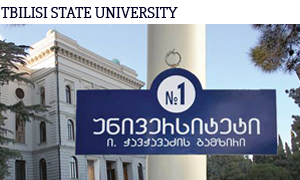
FACULTY OF EXACT AND NATURAL SCIENCES
The Effects of Stress on the Cellular Metabolism of the Brain
Stress is closely linked with the process of industrialization and it can cause or significantly aggravate human diseases and disorders including cardio-vascular disease, disorders of the immune system, impaired neurodegenerative processes and tumors. Stress has a negative influence on labor capacity by causing short term memory loss, absenteeism, poor concentration, increased aggressiveness, etc. The American Psychological Association (APA) describes chronic stress as “the stress of unrelenting demands and pressures for seemingly interminable periods of time.” The major causes of human mortality are connected with stress--like heart and lung diseases, cancer, accidents, cirrhosis and suicide. Georgian scientists have joined the world of research on this subject.
Since 2007 the Biochemistry Department of the Faculty of Exact and Natural Sciences has conducted research on stress as the cause of various pathologies. For this purpose a research unit was established as the Institute for Researching Stress Molecular Mechanisms with the collaboration of the department’s academic personnel and invited specialists, doctoral candidates as well as masters and bachelor students. The group is led by Nana Koshoridze, Professor and Head of the Biochemistry Department. The Institute received a grant from the Shota Rustaveli National Science Foundation (2009-2012) to conduct research on the “Influence of Long Term Emotional Stress on Cell Metabolism in the Brain”. Twelve publications resulted from this research, including four published in impact factor scientific journals and reports were made internationally at conferences and symposiums.
 The research showed how stress can cause undesirable consequences through its ability to impact the biochemical transformations in rats. It was also shown that emotional stress represents an important factor in the formation of aggressive behavior, which has biochemical, hormonal and genetic bases. Presently no data is available about the variations in sensitivity to chronic emotional stress between naturally aggressive and nonaggressive animals. However, a positive correlation was observed between the quantitative change of adrenocortical hormones (a biologically active mixture synthesized in specific areas of the brain, particularly in hypophysis that releases hormones) and the intensification of the aggression controlling system in the brain.
The research showed how stress can cause undesirable consequences through its ability to impact the biochemical transformations in rats. It was also shown that emotional stress represents an important factor in the formation of aggressive behavior, which has biochemical, hormonal and genetic bases. Presently no data is available about the variations in sensitivity to chronic emotional stress between naturally aggressive and nonaggressive animals. However, a positive correlation was observed between the quantitative change of adrenocortical hormones (a biologically active mixture synthesized in specific areas of the brain, particularly in hypophysis that releases hormones) and the intensification of the aggression controlling system in the brain.
The main goal of this research at the TSU Biochemistry Department is to study the influence of various stress factors on aggressive behavior and to determine the importance of the creatine kinase (CK) system in this process. Today the creatine/creatine kinase/phosphocreatine (Cr/CK/Pcr) system is considered an important metabolic regulator of cell functioning, the failure of which may contribute to the development of a number of pathologies. For this system to function effectively it depends on creatine phosphokinase enzyme activity and is carried out through transphosphorylation between creatine (nitrogenous organic acid that occurs naturally in vertebrates and helps to supply energy to all cells in the body, primarily muscle) and phosphocreatine.
The reduction of CK activity is considered an important marker of age-related neurodegenerative disease. Its impairment is key for detecting neurodegeneration. If possible it is important to restore normal CK activity when it has been impaired by external factors and to reduce further risks.
The research shows the interrelation between the functioning of creatine kinase system in a rat’s brain and the chronic stress caused by isolation and the interruption of the circadian rhythm. The experiments showed that stress causes a reduction in the energy metabolism in the brain, expressed by a reduction of the activity of enzymes, including succinate dehydrogenase, fumarase, aconitase, and aldolase acting within the Cr/CK/Pcr system. A similar situation can be observed in cardiac muscle. The research showed that changes in the energy metabolism are taking place in the brain, while cardiomyocytes are also changing, in a context of intensified peroxidation.
This is confirmed by a weakened functioning of the antioxidant enzyme system. It is known that antioxidants hamper or slow down the process of oxidation of other molecules, and respectively, they slow down the formation of free radicals, which harm the cells. Harming the cells causes the development of undesirable processes in the rat’s organism. The weak functioning of the antioxidant system is expressed in a sharp reduction in the activity of its enzymes--superoxide dismutase (SOD), catalase, glutathione peroxidase, glutathione reductase--and an accumulation of peroxidation substances. The data represent the result of oxidative stress caused by animal isolation and changes in circadian rhythm. Intensification of the peroxidation processes is accompanied by mitochondrial dysfunction reflected by the condition of mytochondrial mega channels. These results are further strengthened by data on the participation of various signal molecules in the apoptosis process, as well as by a quantitative increase of apoptotic, damaged mitochondria.
The research also shows preventive, antioxidant properties of mitochondrial creatine kinase that depends on a Pcr/Cr ratio. Creatine has protective properties that appear to play a significant role in the process of stress prevention and treatment of some neurodegenerative diseases. Creatine reveals antioxidant properties close to superoxide anion (O2*-) and peroxynitrite (OONO-); however, it fails to significantly reduce the level of hydrogen peroxide and the intensity of lipid peroxidation. It also fails to reveal antioxidant properties towards uncharged non-radical hydro peroxides.
According to the authors of the research, it is unknown how much the sensitivity of a rat’s organism to chronic stress depends on its aggressiveness, or else how it may be reflected in the activity of creatine kinase and antioxidant systems. However, it is known that increasing creatine kinase activity in test animals is associated with aggressive behaviors, while the lack of creatine caused by defects in its transport protein trigger grave and frequently lethal consequences.
Professor Koshoridze pointed out that the peripheral transport of creatine and endogenous synthesis are two important ways of normally supplying the brain with creatine. Data have been obtained on relatively low creatine transport in brain cells, for example even high dose creatine supplements given to animals suffering with a deficiency of synthesizing enzymes does not produce a satisfactory result. The endogenous synthesis in the brain depends on the supply of arginine amino acid from the blood to the central nervous system, as well as local trafficking of arginine through brain cells. Apparently, cationic amino acid transporters (CATs) play an important role in this ongoing brain process. The research reveals that a protective role of creatine in the process of cellular metabolism is impaired by chronic emotional stress.
The researchers will continue to study this issue and have filed for further financial support.




